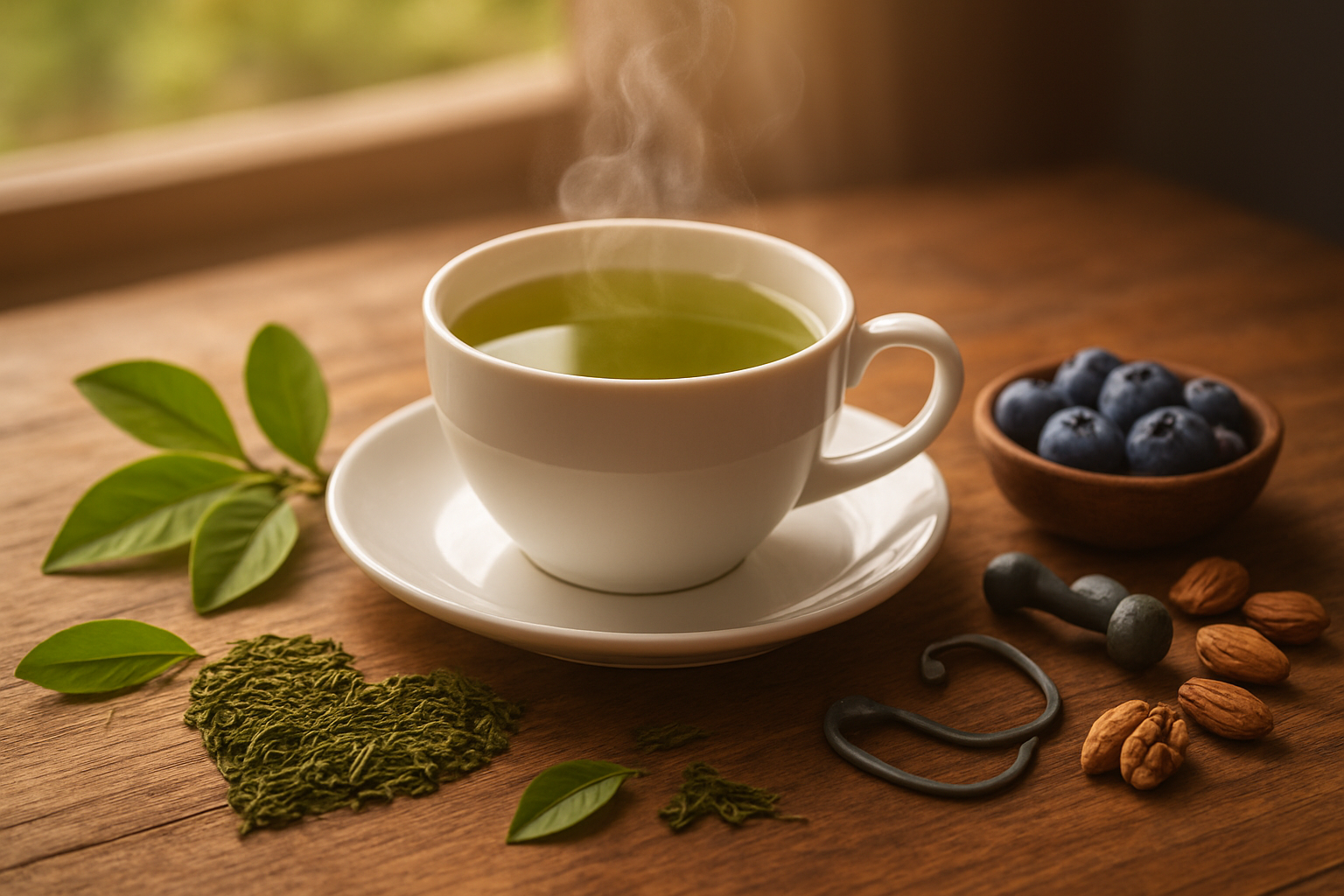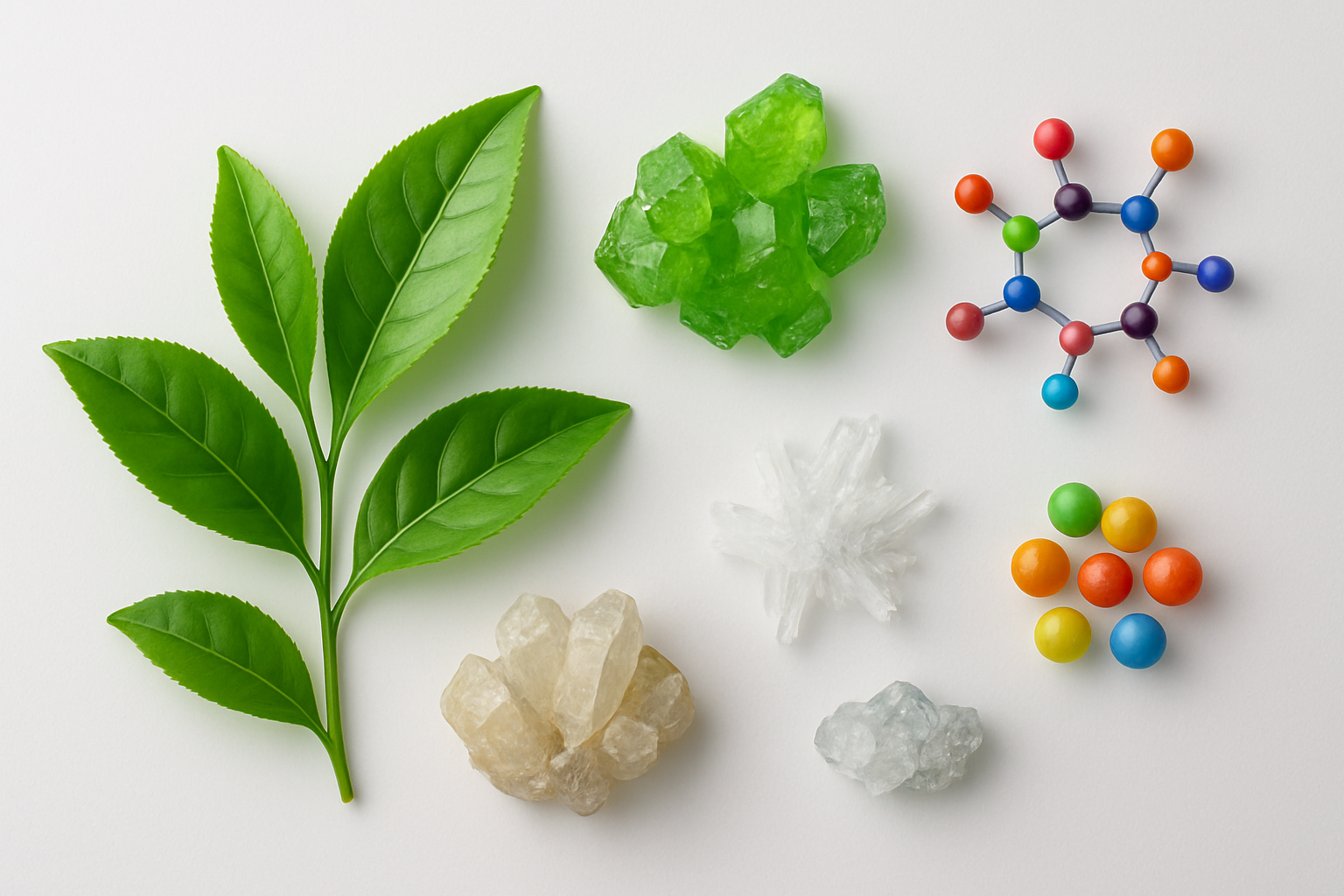Green tea has become one of the world’s most popular beverages, and for good reason. This ancient drink offers impressive health benefits that science continues to uncover, but like any wellness choice, it comes with both advantages and potential risks you should know about.
This guide is perfect for health-conscious individuals, tea enthusiasts, and anyone curious about adding green tea to their daily routine. We’ll explore the powerful antioxidants and nutrients that make green tea special, examine possible side effects and who should be cautious, and show you how to drink it safely for maximum health benefits.
By the end, you’ll have a clear picture of whether green tea deserves a spot in your wellness routine and exactly how to make it work for your lifestyle.
Powerful Health Benefits of Green Tea

Boosts Metabolism and Supports Weight Management
Green tea contains catechins, particularly epigallocatechin gallate (EGCG), which naturally rev up your metabolic rate. These compounds work by increasing thermogenesis – the process where your body burns calories to produce heat. Studies show that drinking green tea can boost your metabolism by 4-5% throughout the day, which might seem small but adds up over time.
The weight management benefits go beyond just burning more calories. Green tea helps your body break down fat more efficiently, especially stubborn belly fat. The combination of caffeine and catechins creates a synergistic effect that enhances fat oxidation during both rest and exercise. Research indicates that people who drink green tea regularly tend to lose more weight around their midsection compared to those who don’t.
What makes green tea particularly effective is how it targets visceral fat – the dangerous type that wraps around your organs. Regular consumption can reduce waist circumference and improve body composition without requiring dramatic lifestyle changes.
Strengthens Immune System Function
Your immune system gets a significant boost from green tea’s rich antioxidant profile. The polyphenols in green tea act like shields, protecting your cells from harmful free radicals that can weaken your body’s natural defenses. These antioxidants are particularly effective at neutralizing oxidative stress, which often leaves you more susceptible to illness.
Green tea’s antimicrobial properties help fight off bacteria and viruses before they can establish infections. The catechins work as natural antibiotics, targeting harmful microorganisms while preserving beneficial bacteria in your gut. This selective action maintains a healthy microbiome, which plays a crucial role in overall immune function.
Regular green tea consumption has been linked to fewer cold and flu episodes. The tea’s anti-inflammatory compounds reduce chronic inflammation that can suppress immune responses. People who drink green tea consistently often report feeling more resilient during cold and flu season, with faster recovery times when they do get sick.
Enhances Brain Health and Mental Clarity
The cognitive benefits of green tea come from its unique combination of caffeine and L-theanine, an amino acid that promotes calm alertness. Unlike the jittery energy from coffee, green tea provides steady focus without the crash. L-theanine increases alpha brain wave activity, creating a relaxed yet alert mental state that’s perfect for concentration and learning.
Green tea protects your brain from age-related decline through its neuroprotective properties. The EGCG in green tea crosses the blood-brain barrier and helps prevent the formation of plaques associated with Alzheimer’s disease. Regular consumption may reduce the risk of cognitive decline and help maintain memory function as you age.
The antioxidants in green tea also improve blood flow to the brain, ensuring your neurons get the oxygen and nutrients they need to function optimally. This enhanced circulation supports better decision-making, improved reaction times, and sharper mental clarity throughout the day. Many people notice improved focus and mental stamina within just a few days of adding green tea to their routine.
Protects Heart Health and Reduces Disease Risk
Green tea offers remarkable cardiovascular protection through multiple mechanisms. The flavonoids help relax blood vessels, improving circulation and reducing blood pressure. Regular consumption can lower both systolic and diastolic blood pressure, particularly beneficial for people with mild hypertension.
Cholesterol management is another area where green tea excels. The catechins prevent the oxidation of LDL cholesterol – the process that makes “bad” cholesterol particularly harmful to your arteries. Green tea also helps increase HDL (“good”) cholesterol while reducing total cholesterol levels, creating a healthier lipid profile.
The anti-inflammatory properties of green tea reduce chronic inflammation in blood vessels, which is a major contributor to heart disease. Studies show that people who drink green tea regularly have a 20-25% lower risk of heart disease and stroke. The tea’s ability to improve arterial flexibility and reduce blood clotting risk further enhances cardiovascular protection, making it a simple yet powerful addition to heart-healthy lifestyle choices.
Essential Nutrients and Active Compounds

Antioxidant-Rich Catechins for Cellular Protection
Green tea’s superstar compounds are catechins, particularly epigallocatechin gallate (EGCG), which makes up about 50-80% of the catechin content. These polyphenolic compounds act like tiny shields for your cells, neutralizing harmful free radicals that can damage DNA and accelerate aging. EGCG stands out as the most potent, with studies showing it’s 25-100 times more effective than vitamins C and E in protecting cells from oxidative stress.
The catechin family includes four main types:
- EGCG (Epigallocatechin gallate) – The most abundant and powerful
- EGC (Epigallocatechin) – Strong antioxidant properties
- ECG (Epicatechin gallate) – Anti-inflammatory effects
- EC (Epicatechin) – Supports cardiovascular health
A single cup of green tea contains approximately 50-100mg of catechins, with matcha powder delivering even higher concentrations due to consuming the entire leaf. These compounds work synergistically, creating a protective network that helps maintain cellular integrity and supports your body’s natural defense systems.
L-Theanine for Stress Reduction and Focus
L-theanine is green tea’s secret weapon for mental clarity and calm alertness. This unique amino acid, found almost exclusively in tea plants, creates a fascinating partnership with caffeine that sets green tea apart from coffee. While a cup of green tea contains about 20-50mg of L-theanine, this amount is enough to promote alpha brain wave activity associated with relaxed focus.
The L-theanine and caffeine duo works like this:
- Caffeine provides energy and alertness (20-50mg per cup)
- L-theanine smooths out caffeine’s jittery effects
- Together they enhance cognitive performance without the crash
Research shows L-theanine crosses the blood-brain barrier within 30-50 minutes of consumption, increasing levels of calming neurotransmitters like GABA, serotonin, and dopamine. This creates what many describe as “calm alertness” – you feel focused and energized without anxiety or restlessness.
Regular green tea drinkers often report better stress management and improved ability to concentrate during demanding tasks, making it an excellent alternative to high-caffeine beverages.
Vitamins and Minerals for Overall Wellness
Green tea delivers a surprising array of essential nutrients beyond its famous antioxidants. Each cup provides meaningful amounts of vitamins and minerals that support various bodily functions, making it more than just a flavorful beverage.
Key Vitamins:
- Vitamin C – Immune system support and collagen synthesis
- Vitamin E – Additional antioxidant protection
- Vitamin K – Bone health and blood clotting
- B-complex vitamins – Energy metabolism support
Essential Minerals:
- Fluoride – Dental health protection
- Manganese – Bone development and wound healing
- Potassium – Heart function and blood pressure regulation
- Magnesium – Muscle and nerve function
| Nutrient | Amount per Cup | Daily Value % |
|---|---|---|
| Vitamin C | 6mg | 7% |
| Manganese | 0.4mg | 17% |
| Fluoride | 0.3mg | Variable |
| Potassium | 19mg | <1% |
The mineral content varies based on soil conditions where the tea grows, with high-quality teas from mineral-rich soils providing higher concentrations. Japanese green teas like sencha and matcha typically contain more nutrients than heavily processed varieties, since minimal processing preserves the natural vitamin and mineral content of the fresh leaves.
Potential Health Risks and Side Effects

Caffeine Sensitivity and Sleep Disruption
Green tea contains about 25-50 milligrams of caffeine per cup, significantly less than coffee but still enough to cause problems for sensitive individuals. People who metabolize caffeine slowly may experience jitters, anxiety, rapid heartbeat, or restlessness even from moderate green tea consumption. The timing of your tea intake matters too – drinking green tea late in the afternoon or evening can interfere with sleep patterns, making it harder to fall asleep or causing lighter, less restful sleep.
If you’re pregnant or breastfeeding, caffeine sensitivity becomes even more important. The American College of Obstetricians and Gynecologists recommends limiting caffeine intake to 200 milligrams daily during pregnancy, meaning you’d need to count your green tea consumption alongside other caffeinated beverages.
Iron Absorption Interference
The tannins in green tea can significantly reduce your body’s ability to absorb non-heme iron – the type found in plant foods like spinach, beans, and fortified cereals. These compounds bind to iron in your digestive tract, preventing proper absorption and potentially leading to iron deficiency over time, especially in vegetarians or people with already low iron levels.
The timing of your tea consumption makes a difference here. Drinking green tea with meals or within an hour of eating iron-rich foods can reduce iron absorption by up to 70%. If you rely on plant-based iron sources or have been diagnosed with iron deficiency, consider spacing your green tea consumption at least two hours away from meals or taking it between meals instead.
Liver Health Concerns with Excessive Consumption
While moderate green tea consumption is generally safe, drinking large amounts or taking concentrated green tea extracts can stress your liver. Cases of liver toxicity have been reported, particularly with high-dose green tea supplements that contain concentrated amounts of catechins like EGCG. These supplements can deliver 10-50 times the amount of active compounds found in a regular cup of tea.
Most liver-related issues occur with supplement use rather than regular tea drinking, but even excessive amounts of brewed green tea – more than 8-10 cups daily – have occasionally been linked to liver problems. People with existing liver conditions should be especially cautious and consult their healthcare provider before increasing their green tea intake significantly.
Medication Interactions and Blood Thinning Effects
Green tea can interact with several medications, creating potentially serious health risks. The most concerning interaction involves blood-thinning medications like warfarin. Green tea contains vitamin K, which can reduce the effectiveness of these medications, while its catechins may enhance anticoagulant effects in some people, creating unpredictable changes in blood clotting.
Other medications that may interact with green tea include:
- Beta-blockers: Green tea’s caffeine can reduce their effectiveness
- Stimulant medications: May amplify side effects like increased heart rate
- Certain antibiotics: Can increase caffeine levels in your system
- Iron supplements: Reduced absorption when taken together
- Chemotherapy drugs: May interfere with treatment effectiveness
If you take any prescription medications regularly, discuss your green tea consumption with your doctor or pharmacist. They can advise you on proper timing or whether you should limit your intake to avoid potentially dangerous interactions.
Optimal Consumption Guidelines for Maximum Benefits

Recommended Daily Intake Amounts
Most health experts agree that 2-3 cups of green tea per day provides the sweet spot for maximizing benefits while minimizing risks. This translates to approximately 200-300mg of polyphenols and 50-90mg of caffeine daily. If you’re new to green tea, start with one cup daily and gradually increase your intake over a week or two.
Your individual tolerance plays a big role here. People sensitive to caffeine should stick to the lower end of this range, while those who handle stimulants well can safely enjoy up to 4 cups daily. Pregnant and breastfeeding women should limit their intake to no more than 1-2 cups per day due to caffeine content.
Quality matters just as much as quantity. One cup of high-grade loose-leaf green tea often delivers more antioxidants than multiple cups of low-quality tea bags. Pay attention to your body’s signals – if you experience jitters, sleep disruption, or stomach upset, reduce your consumption.
Best Times to Drink Green Tea
Timing your green tea consumption can make a huge difference in how your body absorbs its nutrients and how you feel throughout the day. The ideal window is between meals, roughly 30-60 minutes after eating. This prevents the tannins in green tea from interfering with iron absorption from your food.
Morning consumption works wonderfully for most people, providing a gentler caffeine boost compared to coffee. However, avoid drinking green tea first thing on an empty stomach, as this can cause nausea or stomach irritation in sensitive individuals.
The afternoon slump around 2-3 PM is another perfect time for a cup. Green tea’s moderate caffeine content can help maintain alertness without disrupting nighttime sleep patterns. Stop consuming green tea at least 4-6 hours before bedtime to avoid sleep interference.
Skip green tea with iron-rich meals like red meat, spinach, or fortified cereals. The polyphenols can reduce iron absorption by up to 70%. If you take iron supplements, maintain at least a 2-hour gap between supplementation and tea consumption.
Proper Brewing Techniques for Nutrient Retention
Water temperature is critical for extracting maximum antioxidants without releasing excessive tannins that create bitterness. Use water heated to 160-180°F (70-80°C) rather than boiling water. If you don’t have a thermometer, let boiling water sit for 2-3 minutes before pouring.
Steeping time directly impacts both flavor and nutrient content. Aim for 2-3 minutes for most green teas. Longer steeping increases antioxidant extraction but also releases more caffeine and tannins, potentially causing bitterness and digestive issues.
Use one teaspoon of loose leaves or one tea bag per 8 oz of water. High-quality loose-leaf teas can often be steeped 2-3 times, with each steeping releasing different compounds. The first steep typically contains the most caffeine, while subsequent steeps offer more complex flavors and additional antioxidants.
Store your green tea properly to maintain its potency. Keep it in an airtight container away from light, heat, and moisture. Fresh tea retains more beneficial compounds than tea that’s been sitting around for months.
Green Tea’s Impact on Specific Health Conditions

Cancer Prevention and Treatment Support
Green tea’s cancer-fighting properties have captured the attention of researchers worldwide, with studies showing promising results across multiple cancer types. The star compound here is EGCG (epigallocatechin gallate), which makes up about 50-80% of green tea’s catechins. This powerful antioxidant works by neutralizing free radicals that can damage DNA and trigger cancerous cell growth.
Research has shown particularly encouraging results for breast, prostate, and colorectal cancers. In one large-scale study of over 40,000 Japanese adults, those who drank five or more cups of green tea daily had a 23% lower risk of developing colorectal cancer compared to those who drank less than one cup per day. For breast cancer, studies suggest that women who consume green tea regularly may reduce their risk by up to 20-30%.
The anti-cancer effects go beyond prevention. Green tea compounds can actually slow down tumor growth by interfering with the blood supply that feeds cancer cells – a process called angiogenesis. Some studies have found that cancer patients who drink green tea alongside conventional treatments may experience better outcomes and fewer side effects from chemotherapy.
What makes green tea especially interesting is its ability to target cancer stem cells, which are often responsible for cancer recurrence. Traditional treatments might kill most cancer cells but leave these stubborn stem cells behind. Green tea’s catechins appear to make these cells more vulnerable to treatment.
Diabetes Management and Blood Sugar Control
Managing blood sugar levels becomes much easier with regular green tea consumption. The beverage works on multiple fronts to keep glucose levels stable and improve insulin sensitivity. Unlike coffee, which can cause blood sugar spikes, green tea actually helps your body process glucose more efficiently.
The magic happens through several mechanisms. Green tea catechins slow down the absorption of carbohydrates in your intestines, preventing those sharp blood sugar spikes after meals. They also boost your muscle cells’ ability to take up glucose from the bloodstream, even without insulin – think of it as giving your muscles better glucose receptors.
Studies consistently show impressive results. People with type 2 diabetes who drink green tea regularly can see their fasting blood glucose drop by 15-20 mg/dL within just 8-12 weeks. Even more impressive is the improvement in HbA1c levels – a key marker that shows your average blood sugar over three months. Regular green tea drinkers often see reductions of 0.5-1.0% in their HbA1c readings.
For people at risk of developing diabetes, green tea offers excellent protection. A massive study following over 17,000 Japanese adults for five years found that those drinking six or more cups daily had a 33% lower risk of developing type 2 diabetes.
The timing matters too. Drinking green tea 30 minutes before meals can reduce post-meal blood sugar spikes by up to 25%. This makes it an excellent addition to your daily routine, especially if you’re dealing with prediabetes or trying to maintain healthy glucose levels.
Cholesterol Reduction and Cardiovascular Health
Your heart gets multiple benefits from regular green tea consumption, with cholesterol management being just one piece of the cardiovascular puzzle. The catechins in green tea work like tiny cleanup crews in your bloodstream, helping remove the “bad” LDL cholesterol while preserving or even boosting the “good” HDL cholesterol.
Clinical studies show that drinking 2-3 cups of green tea daily can reduce total cholesterol by 7-10 mg/dL and LDL cholesterol by 12-15 mg/dL within 8-12 weeks. These numbers might seem modest, but they translate to meaningful reductions in heart disease risk – every 1 mg/dL drop in LDL cholesterol reduces heart attack risk by about 1%.
Green tea’s cardiovascular benefits extend far beyond cholesterol. The antioxidants help keep your blood vessels flexible and healthy by protecting the delicate lining of your arteries. This reduces inflammation and prevents the formation of dangerous blood clots that can trigger heart attacks or strokes.
Blood pressure improvements are another major benefit. Regular green tea consumption can reduce systolic blood pressure by 3-5 mmHg and diastolic pressure by 2-3 mmHg. While these changes might seem small, they can significantly impact long-term cardiovascular health.
The beverage also helps regulate heart rhythm and may reduce the risk of atrial fibrillation – an irregular heartbeat that affects millions of people. Some studies suggest that people who drink green tea regularly have up to 20% lower rates of heart disease and stroke compared to non-tea drinkers.

Green tea packs a serious punch when it comes to health benefits, loaded with antioxidants and nutrients that can boost your immune system, support heart health, and even help with weight management. The catechins and polyphenols in green tea work like tiny soldiers fighting off harmful free radicals in your body, while also supporting brain function and reducing inflammation. Just remember that moderation is key – drinking too much can lead to caffeine-related jitters, sleep issues, or iron absorption problems.
If you’re looking to add green tea to your daily routine, stick to 2-3 cups per day and pay attention to how your body responds. Whether you’re dealing with high cholesterol, trying to manage your weight, or simply want to give your overall health a natural boost, green tea can be a simple yet powerful addition to your wellness toolkit. Start small, listen to your body, and enjoy this ancient drink that’s been keeping people healthy for thousands of years.









